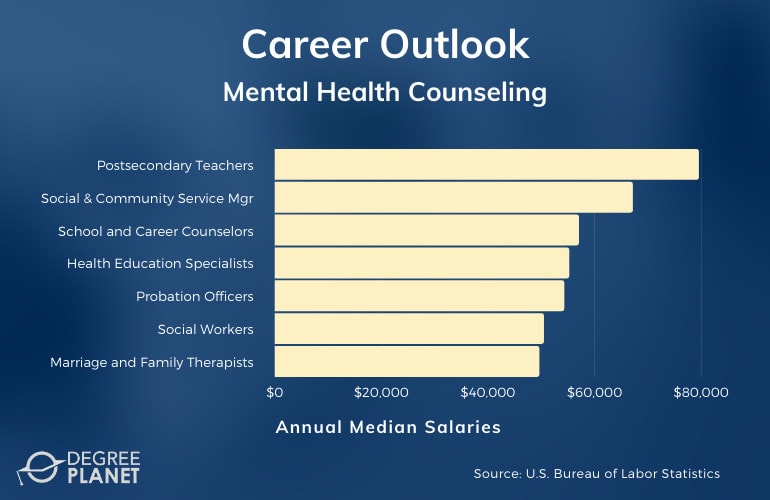What can you do with a masters in mental health counseling? If you’re interested in helping others, then this might be one of your top career questions.

A degree in mental health counseling can help equip you with valuable training for making a meaningful difference in other people’s lives.
Editorial Listing ShortCode:
Mental health counseling careers are available in diverse settings, and you may have opportunities to tailor your work to the type of counseling that most interests you.
What Can You Do with a Masters in Mental Health Counseling?

If you’re considering earning a master’s degree in counseling, then your goal may be to become a licensed mental health counselor. Within the counseling field, there are a variety of specialties to consider.
For example, you may be a private-practice mental health counselor who books appointments with individuals or families who are struggling with grief or depression. A therapist’s involvement can help couples improve their communication and help parents enact effective discipline strategies.
Counselors may work with youths, adults, and senior citizens. Some focus on helping people with disabilities, addictions, or health conditions.
Editorial Listing ShortCode:
Rehabilitation counselors provide support for independent living. Addiction counselors assist during drug or alcohol treatment. Corrections counselors stay in touch with parolees. School counselors try to help kids and teens succeed academically.
Your state may require different types of licensure for these various counseling paths. A background in mental health might also help you meet the requirements for social work licensure.
Related career options include providing mental health education or supporting neighborhood wellness as a community health worker. Social service managers lead local agencies and nonprofit groups. Having a master’s degree might also help you pursue a job as an adjunct college professor.
Some students choose to specialize and earn an addiction counseling degree online or on campus, so they can work with people with this special need.
5 Things You Can Do with a Masters in Mental Health Counseling

Most mental health counseling students choose this field because they want to offer therapy services to people in need of guidance, support, or strategies for shifting their thoughts or behaviors.
Within the counseling field, there are a variety of roles you may hold, each offering a different way to help others.
1. Mental Health Counselor
People who are struggling with mental health conditions, like depression and anxiety, sometimes seek out the services of mental health counselors.
The Bureau of Labor Statistics says that substance abuse, behavioral disorder, and mental health counseling jobs are growing at a 25% rate. Clients may be going through a period of crisis or may be seeking help with a chronic condition. Some mental health counselors specialize in working with specific populations, such as adolescents or senior citizens.
2. Substance Abuse Counselor

Addiction counselors help people with substance abuse disorders and other addictive behaviors. A mental health background can be particularly useful for helping clients whose addictions are compounded by co-occurring disorders.
Inpatient and outpatient drug and alcohol treatment centers are common workplaces for addiction counselors. Other counselors may be employed in hospitals, private practices, correctional facilities, or family service agencies.
3. Family Counselor

Some mental health counselors work with families to help them navigate the challenges of daily relationships, grief, mental health disorders, or addiction issues.
Couples therapy is a similar service. Through counseling, families might learn to communicate better or respond to each other in healthier ways. Family counselors may work in private practice or partner with healthcare facilities, government agencies, or outpatient treatment centers.
4. Social and Community Service Manager

While many people with an MS in Mental Health Counseling choose to work directly with clients, others take leadership roles in organizations that serve people in need.
Responsibilities for such a role may include staff organization, program development, fundraising, and outreach. The Bureau of Labor Statistics says that these jobs are growing at a 17% rate. Potential employment sites may include nursing homes, social service agencies, shelters, and community health centers.
5. Correctional Treatment Specialist
Correctional counselors work with people who are on probation or parole. They may help offenders reintegrate into society and become productive community members.
Editorial Listing ShortCode:
They might also perform mental health assessments and provide status reports to criminal justice officials. According to the Bureau of Labor Statistics, probation officers and correctional treatment specialists usually earn between $36,990 and $98,510 annually. Some of the highest-paying jobs are with state and local governments.
Mental Health Counseling Careers & Salaries

According to the Bureau of Labor Statistics, jobs in community and social service pay an average annual salary of $47,520. This job category is growing at a 12% rate. Potential mental health counselor careers include:
| Careers | Annual Median Salaries |
| Postsecondary Teachers | $80,790 |
| Social and Community Service Managers | $69,600 |
| School and Career Counselors | $58,120 |
| Health Education Specialists | $56,500 |
| Probation Officers and Correctional Treatment Specialists | $55,690 |
| Social Workers | $51,760 |
| Marriage and Family Therapists | $51,340 |
| Substance Abuse, Behavioral Disorder, and Mental Health Counselors | $47,660 |
| Community Health Workers | $42,000 |
| Rehabilitation Counselors | $37,530 |
A master’s degree in mental health counseling may lead to a career as a counseling practitioner, an educator, or a leader in an organization that serves families or the community.
How to Become a Mental Health Counselor

Mental health counseling is a serious responsibility. To ensure that you’re ready for the role, your state will often require you to obtain education, training, and licensure before you can become an independent practitioner.
Your process may follow these steps:
- Bachelors degree. Complete a bachelor’s degree.
- Masters degree. Pursue a master’s degree in mental health counseling or a related specialty.
- Internship. Serve an internship during your master’s program.
- Supervised work hours. Accumulate clinical practice hours in a supervised setting after graduating with your master’s degree.
- Licensure application. Submit an application to your state licensing board.
- Licensing exam. Pass your state’s official counseling examination, such as the National Clinical Mental Health Counseling Examination (NCMHCE) or the National Counselor Examination (NCE).
One of the most essential steps in becoming a licensed counselor is checking with your state’s licensing board. Requirements can vary greatly from one state to the next. Even within a state, there can be vastly different regulations for the different types of counselors, such as addiction counselors versus marriage therapists.
Editorial Listing ShortCode:
Once you receive your license, you may required to earn continuing education hours and submit applications for license renewals as required. Before selecting a master’s specialty, enrolling in a program, or looking for internship opportunities, you may want to double-check that your efforts will help contribute to your career goals.
What Is Mental Health Counseling?

Mental health counseling is a practice dedicated to helping people solve their problems, overcome their struggles, and achieve emotional wellness.
Counselors are professionals who partner with clients to help them find satisfaction in their lives, relate well to other people, move past difficult circumstances, and improve their mental, emotional, and behavioral health.
Counseling may take place in individual or group sessions. It may also involve collaborative partnerships with various healthcare and social service professionals.
What Does a Mental Health Counselor Do?

Mental health counselors help people improve their lives and find constructive solutions to their problems.
Potential job titles include marriage counselor, addiction counselor, and career counselor. Mental health professionals may work in settings like offices, residential facilities, community centers, hospitals, schools, and government agencies.
Being a counselor is about more than just listening to people talk about their problems. As a mental health counselor, you might also perform tests and assessments, make diagnoses, and develop treatment plans.
What Do You Learn in Mental Health Counseling?

For a Master of Mental Health Counseling, you’ll typically take classes on counseling theories, human development, assessment tools, and mental health disorders. Other courses may address counseling ethics, diversity, trauma, and medication.
You may learn to apply counseling techniques in different settings and with various groups. For example, you might study marriage therapy and youth counseling. You may also talk about providing career guidance, crisis intervention, and addiction treatment. Most programs include practicum experiences and an internship.
Is a Masters in Mental Health Counseling Worth It?

Yes, a masters in mental health counseling is worth it for many students. The Bureau of Labor Statistics is projecting 12% job growth in community and social service occupations over the next 10 years, which is much faster than average.
Common careers in this field include mental health counselor, career counselor, addiction counselor, rehabilitation counselor, and social services manager.
More than just a paycheck, though, mental health careers may also offer the rewarding opportunity to help people in need of your supportive care, thus making a masters degree in mental health counseling worth it for those who want a career helping others.
Getting Your Masters in Mental Health Counseling Online

Becoming a licensed counselor is an admirable goal, and earning a master’s degree in mental health counseling can help you work toward it.
As a mental health counselor, you might work with students, families, couples, or elderly people. Your work may help people with addictions, mental health disorders, physical disabilities, grief, broken relationships, or criminal records.
Much of the preparation for a counseling career can be completed through an online program. An online college may offer more flexible scheduling, and you may take classes and learn from experienced faculty members. Some universities even offer online counseling master’s programs with no GRE requirement for admission.
To learn more about how accredited online courses may help you work toward a fulfilling counseling career, you can start by exploring online master’s degree in mental health counseling programs.

